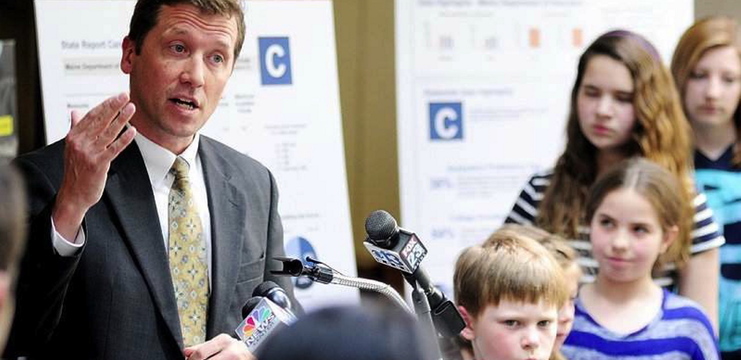There is no question that education reform has been a top priority for the LePage administration since the governor took office in 2011. But there has been considerable debate about the governor’s goals and intentions.
The governor has said that he wants to shake up a complacent system where the needs of teachers and administrators come before the needs of students and their families. Since his days as a candidate, he said his priority is to “put kids first.”
His opponents say that the governor has denigrated schools, exaggerated problems and proposed policies that would make things worse. Rather than put kids first, they argue, he’s hurting students.
The second point of view got a boost this week with the revelation of a series of emails between the governor’s office and former Commissioner of Education Stephen Bowen. In the exchange, made public by the Maine Education Association, it’s clear that last spring the governor was interested in slashing the state’s school budget by $200 million to $300 million. This number is significant because it is about the size of the tax cuts that LePage and the Republican-controlled Legislature passed in 2011, but will build a hole in the budget for years to come.
It’s no surprise that the LePage administration would look to lower spending and cut taxes – that has been the driving principle behind his policy agenda. But it is somewhat surprising to see this in education, which the governor has repeatedly identified as a key investment in Maine’s future. He has proudly said that his 2011 budget increased the state contribution to school funding and that his 2013 budget flat-funded it.
In a June 5, 2013, email, Bowen responded to the governor’s demand that the state consolidate school districts in order to reduce the number of superintendents.
Bowen supported the idea but told a member of the governor’s staff that cutting administrative costs would save only $15 million. If the governor wanted to cut $200 million to $300 million, Bowen wrote, “we are simply going to have to close a lot of small schools.”
LePage did not submit a school-closure bill to the Legislature, but he did propose school choice initiatives that would move public money to private and religious schools and remove all limits on the number of charter schools. That would drain resources from districts, possibly leading to school closures.
The governor and his allies believe that tax cuts lead to economic growth, and that by cutting income tax rates and the inheritance tax, more wealth would stay in the state. But even from an economic growth perspective, cutting schools is the wrong way to make it happen.
Building an educated and qualified work force is one of the key economic roles state government can play. This has not been a partisan issue in the past: Previous Republican, Democratic and independent governors have promoted education reform, and all have tangled with some of the same opponents that LePage is challenging – especially the MEA.
But none of them proposed tearing down the public school system and replacing it with a publicly funded constellation of charter, private, religious and virtual schools, which bypass the usual systems of local control and accountability that the governor claims get in the way of reform.
School districts around the state have cut staff and raised taxes to make up for the needs current state funding won’t meet. This is going to get worse next year, when local districts assume the cost of teacher pensions, which the state will no longer fund.
The amount spent on education is not the sole measure of quality, but it does show commitment. Gov. LePage looks to be committed to doing it on the cheap if his tax cuts are in jeopardy. That’s hardly “putting kids first.”
Send questions/comments to the editors.



Success. Please wait for the page to reload. If the page does not reload within 5 seconds, please refresh the page.
Enter your email and password to access comments.
Hi, to comment on stories you must . This profile is in addition to your subscription and website login.
Already have a commenting profile? .
Invalid username/password.
Please check your email to confirm and complete your registration.
Only subscribers are eligible to post comments. Please subscribe or login first for digital access. Here’s why.
Use the form below to reset your password. When you've submitted your account email, we will send an email with a reset code.